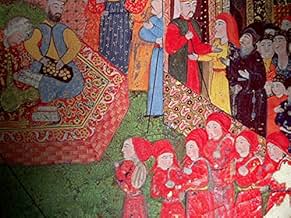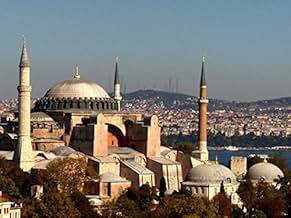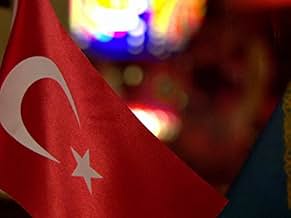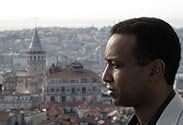Rageh Omaar recounts the epic story of one of the largest and most influential empires in world history, that of the Ottomans.Rageh Omaar recounts the epic story of one of the largest and most influential empires in world history, that of the Ottomans.Rageh Omaar recounts the epic story of one of the largest and most influential empires in world history, that of the Ottomans.
Browse episodes
6.9311
1
2
3
4
5
6
7
8
9
10
Featured reviews
totally manipulated history lessons !
its a shame that bbc providing such a biased documentary, didn't expect this from BBC. facts twisted tried to represent Muslim leaders negative! Do not watch, complete bullshit ! its better to watch pogo then this propaganda. highly disappointed ! very selective panel of historians to speak rubbish about ottomans !
The BBC finally finds an aggressive, authoritarian, slave-trading empire it can get behind...
It is never a promising sign when the title of a documentary is factually incorrect. The Ottomans only ever ruled a small part of Europe, which they gained by conquest, and which was resisted and resented by Europeans. From this falsehood the journalist Rageh Omar - who is not a historian, which shows - tells a distorted history of the Ottoman (Osmanli) Empire which owes more to modern political correctness than historical reality.
The Ottomans are one of histories longest lived and most interesting dynasties and it is a shame that the BBC has only provided 3 hours in which to tell their story and that they have hired a journalist rather than a reputable historian to tell it.
As the title suggests, this is largely the story of the interaction between the Ottomans and Europe, which unfortunately distorts history. The long-running wars against the Shia Persians are mentioned only once, Ottoman attempts at global power (like the naval war for the Indian Ocean with the Portuguese) are ignored, and their alliance with the Barbary Corsairs never even mentioned (which is like a history of the British Empire without the trans-Atlantic slave trade; worse, as it went on longer, enslaved more and was never repudiated).
The first episode covers the creation of the Ottoman dynasty and their wars with the Eastern Roman Empire (wrongly referred to as Byzantium throughout), culminating in the fall of Constantinople. The second covers from the sixteenth century, with Suleiman the Magnificent, to the nineteenth, when it became the "Sick Man of Europe". The third episode covers the Balkan Wars, the First World War, Ataturk's Revolution and the challenges of modern Turkey.
As ever, the Eastern Roman Empire gets short shrift (when will we get a major series on them?). There is no scene setting (the loss of the most important provinces of Christian Syria and Egypt to the Arab Muslims) and Rageh downplays the aggressive, destructive nature of the Turks (who settled in Anatolia because they'd ravaged it). He also leaves out the massacres, rapes, and enslavement of the population of Constantinople after it fell. Admittedly, this was permissible under the rules of war of the day -- but so was the 1099 massacre in Jerusalem by the Crusaders, which BBC documentaries always harp on about. The 4th Crusade is blamed for the fall of Constantinople for sacking it 250 years previously; as opposed to the creeping Turkish conquest of Roman territory and ceaseless assaults on Constantinople presumably...
There is a complete failure to understand that the Ottomans subsequently adopted aspects of Roman culture (the Turkish bath is in fact Roman), with the Sultan taking the title of Caesar and Roman governance/architecture being copied. Even foreign policy was similar: pagan, later Christian, Rome fought Zoroastrian Persia just as Sunni Ottomans fought Shia Persians.
There's a lot of guff about Ottoman multi-culturalism and tolerance which ignores the fact that non-Muslims were still second class citizens. They faced discrimination in the courts, had to pay extra taxes, were denied political power and, in the case of the Christians, were preyed upon by the devshirme; this meant the kidnapping, enslavement and forced conversion of Christian children in order to turn them into Muslim Ottoman soldiers and civil servants. This is defended on the basis that some of these slaves rose to high positions. So what? By these standards, American racial segregation was tolerant and multi-cultural -- but I doubt any BBC documentary would ever argue that!
The Ottomans might have been tolerant in comparison to Tamerlane but they were hardly unique. The Latin Crusader kingdoms operated in the same way, with non-Christians tolerated but nonetheless second class citizens. Again, I doubt we'll get any documentaries arguing that the Crusaders were tolerant multi-culturalists. Anyway, the "multicultural" Ottoman Empire only worked because of harsh collective punishments and a brutal system that used neutral slaves (the devshirme) as a bureaucratic/military elite to prevent ethnic/nationalist conflict. When that faltered, so did the empire. Let's also not forget that the reason the Empire contained so many cultures was because they'd conquered them.
The end of the empire is a chance to attack nationalism, as if the Ottoman subject peoples should be grateful for their own conquest and rule by a foreign power. Amazingly the British are blamed for the ethnic cleansing of Greeks living in Asia by the Turks! Once again the European powers are blamed for creating artificial states in the Middle East (so did the Ottomans; it worked fine so long as an empire ruled over them) after the First World War. He soft-pedals the Armenian Genocide and says it is disputed -- but only by the Turks.
On modern Turkey Rageh is almost delusional. He details the Ataturk Revolution but it's clear that his heart belongs to Erdogan and the promise of a neo-Ottoman, Islamist, democratic, prosperous Turkey. Which is unfortunate because the economy is tanking, their neo-Ottoman foreign policy has failed, Islamism is destroying the successes achieved by secularism, and democracy is under threat (there are over 100 journalists in Turkish jails). He even misunderstands attacks on the historical soap opera "Magnificent Century" as being by secularists who don't want to look backwards when most are actually by Islamists for it (accurately) showing harem women wielding power and the Sultan drinking alcohol.
Ultimately, this is a rubbish series. The history has huge gaps in it, the conclusions are erroneous, the filming is repetitive (and makes bad use of slow-motion), and Rageh doesn't know what he's talking about. Whilst there is a good mix of opinion among the talking heads (although they're overwhelmingly pro-Ottoman), Rageh appears to have a bad case of power worship. In fairness, the series was far too small to deal with its subject properly -- but that doesn't excuse the poor storytelling or the politically distorted history. Much better to buy a good book on the Ottomans instead.
The Ottomans are one of histories longest lived and most interesting dynasties and it is a shame that the BBC has only provided 3 hours in which to tell their story and that they have hired a journalist rather than a reputable historian to tell it.
As the title suggests, this is largely the story of the interaction between the Ottomans and Europe, which unfortunately distorts history. The long-running wars against the Shia Persians are mentioned only once, Ottoman attempts at global power (like the naval war for the Indian Ocean with the Portuguese) are ignored, and their alliance with the Barbary Corsairs never even mentioned (which is like a history of the British Empire without the trans-Atlantic slave trade; worse, as it went on longer, enslaved more and was never repudiated).
The first episode covers the creation of the Ottoman dynasty and their wars with the Eastern Roman Empire (wrongly referred to as Byzantium throughout), culminating in the fall of Constantinople. The second covers from the sixteenth century, with Suleiman the Magnificent, to the nineteenth, when it became the "Sick Man of Europe". The third episode covers the Balkan Wars, the First World War, Ataturk's Revolution and the challenges of modern Turkey.
As ever, the Eastern Roman Empire gets short shrift (when will we get a major series on them?). There is no scene setting (the loss of the most important provinces of Christian Syria and Egypt to the Arab Muslims) and Rageh downplays the aggressive, destructive nature of the Turks (who settled in Anatolia because they'd ravaged it). He also leaves out the massacres, rapes, and enslavement of the population of Constantinople after it fell. Admittedly, this was permissible under the rules of war of the day -- but so was the 1099 massacre in Jerusalem by the Crusaders, which BBC documentaries always harp on about. The 4th Crusade is blamed for the fall of Constantinople for sacking it 250 years previously; as opposed to the creeping Turkish conquest of Roman territory and ceaseless assaults on Constantinople presumably...
There is a complete failure to understand that the Ottomans subsequently adopted aspects of Roman culture (the Turkish bath is in fact Roman), with the Sultan taking the title of Caesar and Roman governance/architecture being copied. Even foreign policy was similar: pagan, later Christian, Rome fought Zoroastrian Persia just as Sunni Ottomans fought Shia Persians.
There's a lot of guff about Ottoman multi-culturalism and tolerance which ignores the fact that non-Muslims were still second class citizens. They faced discrimination in the courts, had to pay extra taxes, were denied political power and, in the case of the Christians, were preyed upon by the devshirme; this meant the kidnapping, enslavement and forced conversion of Christian children in order to turn them into Muslim Ottoman soldiers and civil servants. This is defended on the basis that some of these slaves rose to high positions. So what? By these standards, American racial segregation was tolerant and multi-cultural -- but I doubt any BBC documentary would ever argue that!
The Ottomans might have been tolerant in comparison to Tamerlane but they were hardly unique. The Latin Crusader kingdoms operated in the same way, with non-Christians tolerated but nonetheless second class citizens. Again, I doubt we'll get any documentaries arguing that the Crusaders were tolerant multi-culturalists. Anyway, the "multicultural" Ottoman Empire only worked because of harsh collective punishments and a brutal system that used neutral slaves (the devshirme) as a bureaucratic/military elite to prevent ethnic/nationalist conflict. When that faltered, so did the empire. Let's also not forget that the reason the Empire contained so many cultures was because they'd conquered them.
The end of the empire is a chance to attack nationalism, as if the Ottoman subject peoples should be grateful for their own conquest and rule by a foreign power. Amazingly the British are blamed for the ethnic cleansing of Greeks living in Asia by the Turks! Once again the European powers are blamed for creating artificial states in the Middle East (so did the Ottomans; it worked fine so long as an empire ruled over them) after the First World War. He soft-pedals the Armenian Genocide and says it is disputed -- but only by the Turks.
On modern Turkey Rageh is almost delusional. He details the Ataturk Revolution but it's clear that his heart belongs to Erdogan and the promise of a neo-Ottoman, Islamist, democratic, prosperous Turkey. Which is unfortunate because the economy is tanking, their neo-Ottoman foreign policy has failed, Islamism is destroying the successes achieved by secularism, and democracy is under threat (there are over 100 journalists in Turkish jails). He even misunderstands attacks on the historical soap opera "Magnificent Century" as being by secularists who don't want to look backwards when most are actually by Islamists for it (accurately) showing harem women wielding power and the Sultan drinking alcohol.
Ultimately, this is a rubbish series. The history has huge gaps in it, the conclusions are erroneous, the filming is repetitive (and makes bad use of slow-motion), and Rageh doesn't know what he's talking about. Whilst there is a good mix of opinion among the talking heads (although they're overwhelmingly pro-Ottoman), Rageh appears to have a bad case of power worship. In fairness, the series was far too small to deal with its subject properly -- but that doesn't excuse the poor storytelling or the politically distorted history. Much better to buy a good book on the Ottomans instead.
Rageh Omaar appears to justify the Armenian Genocide, or outright deny it happened
In the end I struggled to decide whether this series was meant as history or propaganda. The most disturbing part for me was watching Rageh Omaar question whether the slaughter of Armenians by the Ottomans was genocide. To most people and historians the deliberate murder of 75% of an ethnic group with the purpose of wiping them out constitutes genocide. Rageh and the BBC can obfuscate this as much as they like for their own political ends, but the wholesale slaughter and destruction of an ethnic group and its culture is certainly genocide. To deny or even justify this is evil of the highest form.
Furthermore, I have a hard time understanding why the Ottomans were portrayed as victims through this 'documentary'. Since when could you be classified as a victim after invading most of the Middle East and southeast Europe, committing slavery and genocide? The true victims were those colonised by the Ottoman Empire, particularly those subjected to genocide on the basis of their faith and ethnicity, which are Armenians, Assyrians, Pontic Greeks and Lebanese Maronites.
Furthermore, I have a hard time understanding why the Ottomans were portrayed as victims through this 'documentary'. Since when could you be classified as a victim after invading most of the Middle East and southeast Europe, committing slavery and genocide? The true victims were those colonised by the Ottoman Empire, particularly those subjected to genocide on the basis of their faith and ethnicity, which are Armenians, Assyrians, Pontic Greeks and Lebanese Maronites.
Details
Contribute to this page
Suggest an edit or add missing content




















